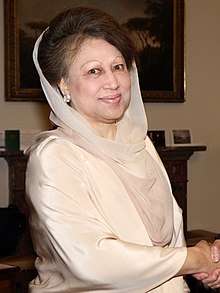Khaleda Zia
Begum Khaleda Zia ( Bengali : খালেদা জিয়া , Khāledā Jiẏā ; born August 15, 1945 in Dinajpur ) is a national conservative Bengali politician and leader of the Bangladesh Nationalist Party . She was Prime Minister of Bangladesh from 1991 to 1996 and from 2001 to 2006 .
Political career
Her husband, then President Ziaur Rahman , was murdered in a failed military coup in 1981. She then became politically active herself and initially fought against the authoritarian government of Hussain Muhammad Ershad . She was placed under house arrest in 1986 because of an election boycott . Together with the leader of the Awami League, Sheikh Hasina Wajed , she led a coalition of opposition groups that brought about the fall of Ershad and thus paved the way for the democratic election in 1991.
As the first woman in the office of prime minister, she ruled from 1991 to 1996, but was replaced as prime minister by her political rival Sheikh Hasina after this term was up. From October 8, 2001, until the change of government, she ruled together with two Islamist coalition partners, for which she was heavily criticized by liberal forces in the country. Although international observers reported massive restrictions on the freedom of the press in Bangladesh, Khaleda Zia only declared in 2004 that there was complete freedom of the press in Bangladesh. Her term of office ended on October 27, 2006.
Khaleda Zia has a bitter rivalry with Hasina Wajed, with whom she took turns in office. At the end of December 2008, Zia lost the parliamentary election with her Bangladeshi Nationalist Party (BNP) against Wajed and its center-left Awami League , which won more than three quarters of the 300 seats to be awarded. Before the parliamentary elections in 2014 there was a dispute and the BNP under Zia accused the ruling Awami League under Sheikh Hasina of wanting to manipulate the election. As a result, the BNP, together with its allied parties, boycotted the 2014 parliamentary election and has not been represented in parliament since then. After the election, Zia called for strikes and public protests to force new elections soon.
Condemnation
In February 2018, a Dhaka court sentenced Zia to a five-year prison term for corruption . Zia was found guilty of embezzling 21 million taka (approximately € 203,000 ). The money came from foreign donations to the Zia Orphanage Trust , an orphaned charity named after her husband. The conviction could make it impossible for her to run for the parliamentary elections, which are scheduled for December 2018. Zia was taken to a Dhaka prison immediately after the verdict was announced, where she is to remain pending an official appeal against the verdict. Her defense lawyer called the verdict politically motivated and said a higher court would not uphold the sentence. The general secretary of the BNP Fakhrul Islam Alamgir said the verdict would not be accepted. In preparation for the pronouncement of the verdict, the authorities have arrested 3,500 functionaries and supporters of the party, according to the BNP. The pronouncement of the verdict was accompanied by strict security measures and violent clashes in Dhaka. There were at least five police officers injured in connection with protests against the verdict.
Together with Zia, their son Tarique Rahman - Vice-President of the BNP - was sentenced in absentia and four other defendants to 10 years in prison. Numerous other cases of corruption and violence by her supporters are pending against Zia.
See also
literature
- Ricarda Gerlach: Female Political Leadership and Dueling Dynasties in Bangladesh. In: Claudia Derichs, Mark R. Thompson (Eds.): Dynasties and Female Political Leaders in Asia. LIT, Berlin 2013, pp. 113–150.
Web links
Individual evidence
- ↑ The Begums compete again. In: Der Standard , December 28, 2008.
- ^ Awami League wins parliamentary election. In: Frankfurter Allgemeine Zeitung , December 30, 2008
- ↑ Bangladesh opposition leader Zia calls for blockade. BBC News, January 5, 2015, accessed February 7, 2016 .
- ↑ Khaleda Zia jailed for 5 years. Greater Kashmir, February 9, 2018, accessed February 9, 2018 .
- ↑ Five years imprisonment for Bangladesh's opposition leader Zia for corruption. AFP on Yahoo News, February 8, 2018, accessed February 9, 2018 .
- ↑ Violent protests as opposition leader is jailed in Bangladesh. The Guardian , February 8, 2018, accessed February 9, 2018 .
| personal data | |
|---|---|
| SURNAME | Khaleda Zia |
| BRIEF DESCRIPTION | Bengali politician, Prime Minister of Bangladesh |
| DATE OF BIRTH | August 15, 1945 |
| PLACE OF BIRTH | Dinajpur |
